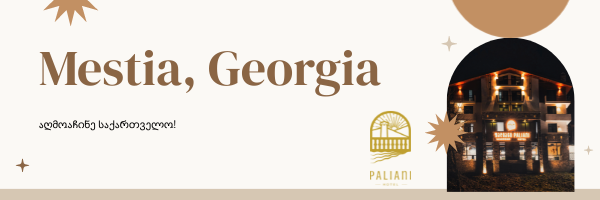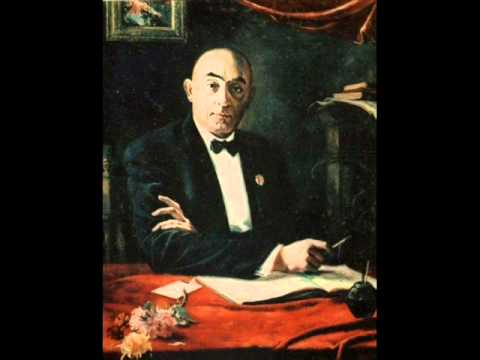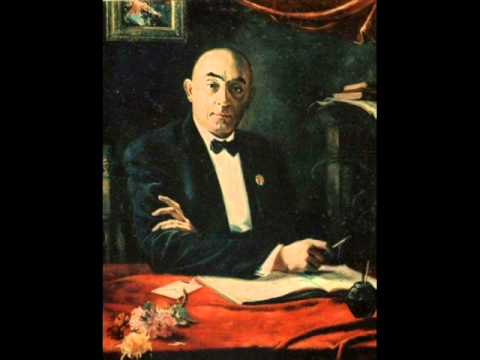Zakaria Paliashvili: "Abesalom da Eteri" (1909-1918)
Zakaria Paliashvili
"Abesalom da Eteri" (1909-1918)
Performed by the Great Chorus and Symphony Orchestra of Radio USSR. Didim Mirzchulava, conductor
Recording from 1979
Librettist: Petr Mirianashvili
0:00:00 Act 1: Scene 1, A wooded landscape - No's 1 thru 4 - Scene 2 - No's 5 thru 7 (32:56)
0:32:56 Act 2: The King's Palace - No's 8 thru 13, Ballet (33:57)
1:06:53 Act 3: Abessalom's Aria - No's 14 and 15, Finale (16:35)
1:23:29 Act 4: Part 1 - Etery's Aria - No's 16 thru 22 (27:36)
1:51:06 Part 2 - No's 23 thru 27, Finale (18:26)
Zakaria Paliashvili (Georgian: ზაქარია ფალიაშვილი) (1871-1933) was a Georgian composer. He is regarded as a founder of Georgian classical music.
As a young boy, he sang in a choir and learned to play the organ in the St. Mary Catholic Church of Kutaisi. His first tutor was his brother Ivan, who later became a conductor. Paliashvili moved to Tbilisi in 1887 as a chorister in the St. Mary Assumption Catholic Church of Tbilisi, eventually entering the music school there, studying French horn and composition. During 1900-1903, he studied composition under Sergei Taneyev at the Moscow Conservatory. Upon returning to his native land, Paliashvili began to play a strong role in developing national music in Georgia. He collected Georgian folk songs, co-founded the Georgian Philharmonic Society, and became head of the Tbilisi Conservatory.
Paliashvili composed works for symphony orchestra (e.g., Georgian Suite on Folk Themes), but is probably best known for his vocal music, which includes choruses and songs. His major works in this regard are the operas Abesalom da Eteri (Absalom and Eteri) (premiered 1919, although a version of Act III was performed in 1913; based on a folk tale "Eteriani"), Daisi (Twilight) (1923), and Latavra (1927).
Abesalom da Eteri is an opera by composer Zakaria Paliashvili and librettist Petr Mirianashvili. Composed between 1909 and 1918, the work was premiered on 21 February 1919 at the Georgian National Opera House in Tbilisi. Music from this opera was later adopted for Tavisupleba, the national anthem of the country of Georgia.
(Ref: Wikipedia)
Synopsis
Act 1
A peasant girl Eteri, having run away from an evil stepmother, sits and cries alone in the woods. She hears a singing of hunters from afar - Prince Abesalom and his courtier Murman are hunting along with their retinue. Eter follows the sound of singing and runs into Murman. Startled by the sudden encounter, she runs the other way but is intercepted by Abesalom. Bewitched by Eter's beauty, the prince pledges his love to her. Murman himself is enamored with the peasant girl, but he is merely a courtier and does not dare to express his feelings. Privately, Murman is overcome by an evil desire to take Eter away from Abesalom.
Act 2
The wedding of Abesalom and Eter is being held the palace. King Abio blesses the engaged, who take the oath of loyalty. As a wedding gift, Murman presents Eter with a small box containing an enchanted necklace. The necklace is to afflict Eter with an incurable illness, from which only Murman can save here. Eter starts to feel unwell but King Abio tries to keep the guests entertained and asks Marekh to sing. The wedding proceeds with dancing and singing.
Act 3
Great misfortune befalls upon the palace – Eter is overcome by an incurable illness. Abesalom falls into desperation and the entire place mourns the developments. The Queen advises her son to let Eter go, suggesting that perhaps mountains and sun with bring her back to health. Abesalom is forced to give in and let Eter go. Murman has achieved his goal – he takes Eter to himself.
Act 4
In Murman's tower Eter comes back to health. Murman's mother and sisters cherish her in every way. When Abesalom hears of this, he starts to long for Eter even more. The prince becomes unable to cope with his separation from Eter and becomes weakened as a result of his suffering. Trumpets sound – Abesalom is finally visiting Murman's tower to see Eter. To get rid of Murman, Abesalom sends him off to find the elixir of life with the pretext that perhaps that will bring his strength back. Murman reluctantly agrees. Queen Natella implores Eter to meet Abesalom, hoping that she will make him feel better, but Eter is refusing – she is angry that her love had given her up and sent her away. Marekh finally convinces Eter to meet Abesalom, but the weakened prince dies in Eter's arms. Struck by grief, Eter kills herself with the same knife, which the prince had once given her as a sign of their love. (Ref: Wikipedia)
Sculpture of “Ali and Nino” by Tamara Kvesitadze.
Located in Batumi.

მსგავსი ვიდეოები

Zakaria Paliashvili Abesalom da Eteri Overture
Achiko Kinkladze

Zakaria Paliashvili - Abesalom da eteri - Ansamble (წამწამი)
Georgian Scores And Music

Zakaria Paliashvili - Aria from Opera Abesalom and Eteri
Achiko Kinkladze

Tavisupleba | Nini Badurashvili | National anthem of Georgia
sandro1
![Georgian Tenors Of The XX Century - Unique Records [CD1]](https://i.ytimg.com/vi/6vKamx4ZXls/hqdefault.jpg?sqp=-oaymwEbCKgBEF5IVfKriqkDDggBFQAAiEIYAXABwAEG\u0026rs=AOn4CLArTIPnuKHiS1jRYPEEkOCwzt38Jg)
Georgian Tenors Of The XX Century - Unique Records [CD1]
RamShemqmnaAdamianad

სახლი აგურის ქუჩაზე და ზაქარია ფალიაშვილის ვალტორნა
რადიო თავისუფლება

Z.Paliashvili - Abesalom da Eteri - Natelas da Eteris dueti
Geo Scores And Music DV

Z.Paliashvili - Abesalom da Eteri - III act Finale - "ყვითელ...
Geo Scores And Music DV